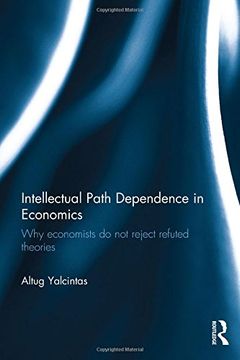Share
Intellectual Path Dependence in Economics: Why Economists Do Not Reject Refuted Theories (in English)
Altug Yalcintas
(Author)
·
Routledge
· Hardcover
Intellectual Path Dependence in Economics: Why Economists Do Not Reject Refuted Theories (in English) - Yalcintas, Altug
$ 190.49
$ 317.48
You save: $ 126.99
Choose the list to add your product or create one New List
✓ Product added successfully to the Wishlist.
Go to My Wishlists
Origin: United Kingdom
(Import costs included in the price)
It will be shipped from our warehouse between
Thursday, June 13 and
Tuesday, June 25.
You will receive it anywhere in United States between 1 and 3 business days after shipment.
Synopsis "Intellectual Path Dependence in Economics: Why Economists Do Not Reject Refuted Theories (in English)"
Is economics always self-corrective? Do erroneous theorems permanently disappear from the market of economic ideas? Intellectual Path Dependence in Economics argues that errors in economics are not always corrected. Although economists are often critical and open-minded, unfit explanations are nonetheless able to reproduce themselves. The problem is that theorems sometimes survive the intellectual challenges in the market of economic ideas even when they are falsified or invalidated by criticism and an abundance of counter-evidence.A key question which often gets little or no attention is: why do economists not reject theories when they have been refuted by evidence and falsified by philosophical reasoning? This book explores the answer to this question by examining the phenomenon of intellectual path dependence in the history of economic thought. It argues that the key reason why economists do not reject refuted theories is the epistemic costs of starting to use new theories. Epistemic costs are primarily the costs of scarcity of the most valued element in academic production: time. Epistemic scarcity overwhelmingly dominates the evolution of scientific research in such a way that when researchers start off a new research project, they allocate time between replicable and un-replicable research.This book is essential reading for anyone interested in the methodology, philosophy and history of economics.
- 0% (0)
- 0% (0)
- 0% (0)
- 0% (0)
- 0% (0)
All books in our catalog are Original.
The book is written in English.
The binding of this edition is Hardcover.
✓ Producto agregado correctamente al carro, Ir a Pagar.

